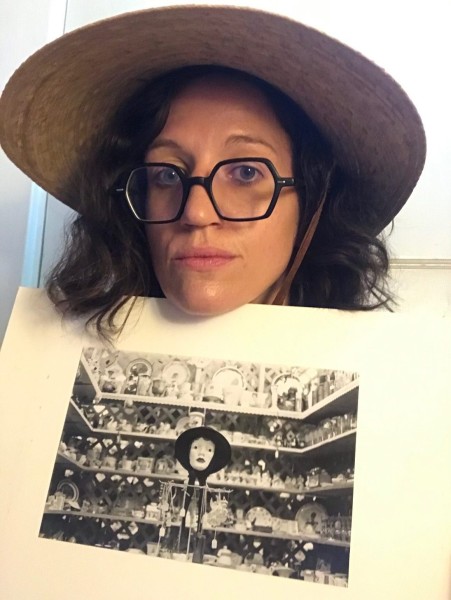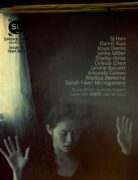To start, I absolutely love the form of this piece, how each paragraph stands on its own, and then the medical history in the middle. It is a beautiful nesting doll of structure. Could you describe the inspiration for forming this story?
Thank you, Lyndsie! If I remember correctly, I wrote the medical history section first—beginning with the idea that she was vomited into existence as her mother was skydiving. My mom really did jump from a plane and vomit on the way down. But I was already born when this happened.
Then the rest of the medical history came out with the same sad, bizarre tone. I like how the intake form/medical history sort of functions as the straight man in a comedy duo. The answers can be totally odd but the next question will remain completely serious. The questions don’t play along.
And the idea of pressure washing brains came to me years ago. My partner/husband/eternal boyfriend has periodic but debilitating migraines. I told him I wished we could power wash his brain. Clean that sucker out, end all suffering. This idea disturbed him. But it stayed with me, apparently.
There is a brilliant surreal quality to this piece, especially with the medical history section—the birth story with her mother jumping out the plane, her wrist breaking under the weight of charms—each bit feels like a micro fairy tale. How does the surreal inspire and inform your work, especially regarding this story?
I think I lean on the surreal to keep things from feeling too bleak, honestly. There’s this Lucia Berlin line that has sort of become my thesis statement: “I don’t mind telling people awful things if I can make them funny.”
The underlying truth of the story is a woman who is tired of replaying the endless loops in her mind, tired of learning the same lessons only to forget them and need to learn them again, tired of herself. And that’s … fairly autobiographical. But writing a straightforward story about being tired of myself doesn’t really appeal to me, so things go a bit sideways.
So much of this story is about the past, looking back, from the medical history to the nineties cruise commercials (and growing up in the nineties myself, this brought on intense nostalgia). I’d love to know about the origin of this idea. Why write these commercials to look back on as opposed to others?
An earlier version of the story didn’t include the detail that the woman had those commercials stuck in her mind. The reason she wanted a brain reset was a lot more vague, more like run-of-the-mill anxiety. And I decided that version was way too downtrodden, a boo-hoo bummer. Adding in the nineties commercials lightened the story slightly, and, like you said, brought in some nostalgia.
I am not sure how I landed on cruise commercials specifically, but maybe it’s because cruises are a contained setting with a “forced fun” feeling. Perhaps being stuck on a boat feeling like you’re supposed to be having the time of your life is a lot like being stuck in your own head feeling like you should be happier.
The story begins and ends with the narrator being in and then leaving a secret clinic, which gave me a sense of a near future, where such places might exist. How do you balance worldbuilding in your flash fiction?
I am usually much more interested in inner worlds than outer worlds. I don’t want to explain myself very much when it comes to settings and time periods, but I also don’t want to confuse anyone. I mean, if no one knows what you’re talking about then you’re not really telling a story. So I try to find a balance between hand-holding and leaving people behind.
I can’t stop imagining what it might sound and feel like to have my brain pressure-washed, to hear that “pop then a whoosh.” Whoosh is such a great word, too. What are some of your favorite sound words? How does sound play a role in your work as a whole, or is it singular to this story?
Ha, now that you mention it, “pop then a whoosh” sounds like a pregnant person’s water breaking—at least the slapsticky way it’s depicted on screen!
I don’t think I have described sound too often in my other work, though I do tend to care more about how words feel and sound than what they actually mean.
And my favorite sound word. Let’s see, does “harumph” count as a sound word? Because that one’s hard to beat. Harumph is my other thesis statement.



 The core workshop of SmokeLong Fitness is all in writing, so you can take part from anywhere at anytime. We are excited about creating a supportive, consistent and structured environment for flash writers to work on their craft in a community. We are thrilled and proud to say that our workshop participants have won, placed, or been listed in every major flash competition. Community works.
The core workshop of SmokeLong Fitness is all in writing, so you can take part from anywhere at anytime. We are excited about creating a supportive, consistent and structured environment for flash writers to work on their craft in a community. We are thrilled and proud to say that our workshop participants have won, placed, or been listed in every major flash competition. Community works.